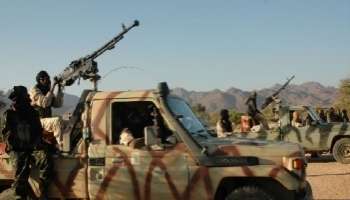UN warns Darfur a potential “fertile ground” for jihadist groups
January 25, 2014 (KHARTOUM) – Sudan’s troubled western Darfur region of may be “potentially fertile ground” for African jihadist radical groups currently active in the continent, particularly in North and West Africa, a report by a panel of UN experts has found.

A five-member panel of independent experts established to monitor compliance with UN Security Council resolutions relating to the Darfur mentioned that the Sudanese officials admitted their support to the Libyan rebel groups including the jihadists.
The committee also pointed to the presence of Al-Qaeda affiliated group (AQIM) in the Niger and Boko Haram in northern Nigeria and finally to the Islamic State in Iraq and the Levant known as Da’esh.
However, the report watered down suggestions of any imminent danger, saying the panel has yet to quantify the actual risk of jihadists groups posed to the security and stability in Darfur.
The experts indirectly pointed to the links between the Sudanese authorities and these radical groups saying that sufi Islamic practices in Darfur and the culture of Darfurian society “are resistant to the Muslim Brotherhood ideology of the ruling National Congress Party” in Khartoum.
“Sudanese Islamist militancy, such as (a) “Ansar al-Sunna” (which advocates the strict application of sharia); (b) the “Liberation Party” (which favours the establishment of a caliphate and recruiting from the Army and tribes); or (c) the “Islamic Constitution Front” (among whom a minority openly supports the so-called Da’esh, which the Government is reportedly looking to ban), are all unattractive to Darfurians,” says the report.
In February 2013, Darfur rebel groups claimed that fighters of a Malian Islamist group had arrived in North Darfur state after attacks by the French and Malian armies on their positions in the West African country.
Fighters from Al-Qaida in the Islamic Maghreb (AQIM), mainly Algerians and Mauritanians as well as Malian Tuareq rebel groups, who are demanding regional autonomy and African Islamists from the Fulani ethnic group took control of northern Mali in April 2012.
FRESH ACCUSATIONS
The rebel Sudan Liberation Movement led by Abdel Wahid al-Nur (SLM-AW) said the recent military campaign launched by the government army and allied militias against rebel positions in Jebel Marra aims to clear the area and to establish a new camp for terrorists groups.
The SLM-AW has “very confidential information that, the regime in Khartoum has piled up and increased its military presence in Jebal Mara to implement its last plan that aims to expel all the citizens living around Jabal Mara; and take over Jabal Marra as a safe haven to host the international Islamic terrorists groups,” said the group in a statement released in English on Saturday.
The group went to add that these groups would work to destabilise the region and neighbouring countries, including Egypt, South Sudan, Uganda, Central African Republic, Chad and Libya.
Al-Nur has called for international efforts to abort the implementation of the plan, underscoring that such groups “are not only dangerous in for the security of Sudan, but a threat to the entire world”.
The Sudanese government has previously denied accusations it is providing support to terror groups.
Khartoum is a signatory to security agreements with Central African Republic, Chad, Egypt and Libya and plans to deploy joint monitoring patrols to control borders and prevent infiltration of armed groups and cross-border attacks.
(ST)
